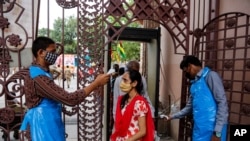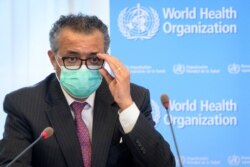India’s daily tally of new COVID cases fell below 40,000 on Sunday. The health ministry reported Monday that there were 37,154 new cases in the previous 24-hour period.
In South Korea, the country reported 1,100 new cases Sunday. The rising caseload comes as South Korea is imposing new restrictions in Seoul and neighboring regions to curb the spread of infections.
Meanwhile in Uganda, Chris Baryomunsi, a government minister said his country has the money to buy vaccines but is having trouble purchasing them from Western countries.
“This is a challenge of access and equity,” Baryomunsi, who is also an epidemiologist, told the Guardian newspaper. “We have the money, but we simply can’t get the vaccine . . . we have to rely on the western world and the western world has focused on its population. The impression is that people there don’t care about Africans.”
Last week, the World Health Organization Director-General Tedros Adhanom Ghebreyesus spoke at the University of Nottingham about the global health disparities the pandemic has exposed. “At the global level, the pandemic has revealed a profound gap, a deficit of solidarity and sharing: the sharing of critical data, sharing of epidemiological information, sharing of resources, technology and tools that every nation needs to keep its people safe.”
The WHO chief said, “We have to learn the lessons of COVID-19. Because it is unprecedented. This pandemic has thrived amid the inequalities and inequities in our societies and exploited the gaps in our health systems. It has exacerbated the disparities between and within countries. As we speak, rich countries are vaccinating their populations while much of the rest of the world is left to watch and wait. And we see the inequity, the injustice. More than 70 percent of all vaccines have been administered in just ten countries.”
As much of the world struggles to vaccinate their populations, Pfizer, the biopharmaceutical company that makes one of the vaccines, says it is time to consider a booster shot to protect against the more contagious variants of the coronavirus. But U.S. Centers for Disease Control and Prevention and the Federal Drug Administration said Friday they don’t believe Americans need another shot yet.
Pfizer said that some of its representatives would meet with officials at the FDA on Monday. The company had said recently that booster shots would be needed within the next 12 months.
Dr. Anthony Fauci acknowledged that booster shots may be needed but said Sunday that it was too soon for the government to recommend another shot. Roughly half of the U.S. population has been fully vaccinated.
The Johns Hopkins Coronavirus Resource Center reported more than 186 million global COVID infections early Monday and more than 4 million global deaths. The U.S. has the most cases with 33.9 million, followed by India with 30.9 million.
Johns Hopkins reported 3.4 billion vaccines have been administered worldwide.
Some information for this report came from Reuters.






